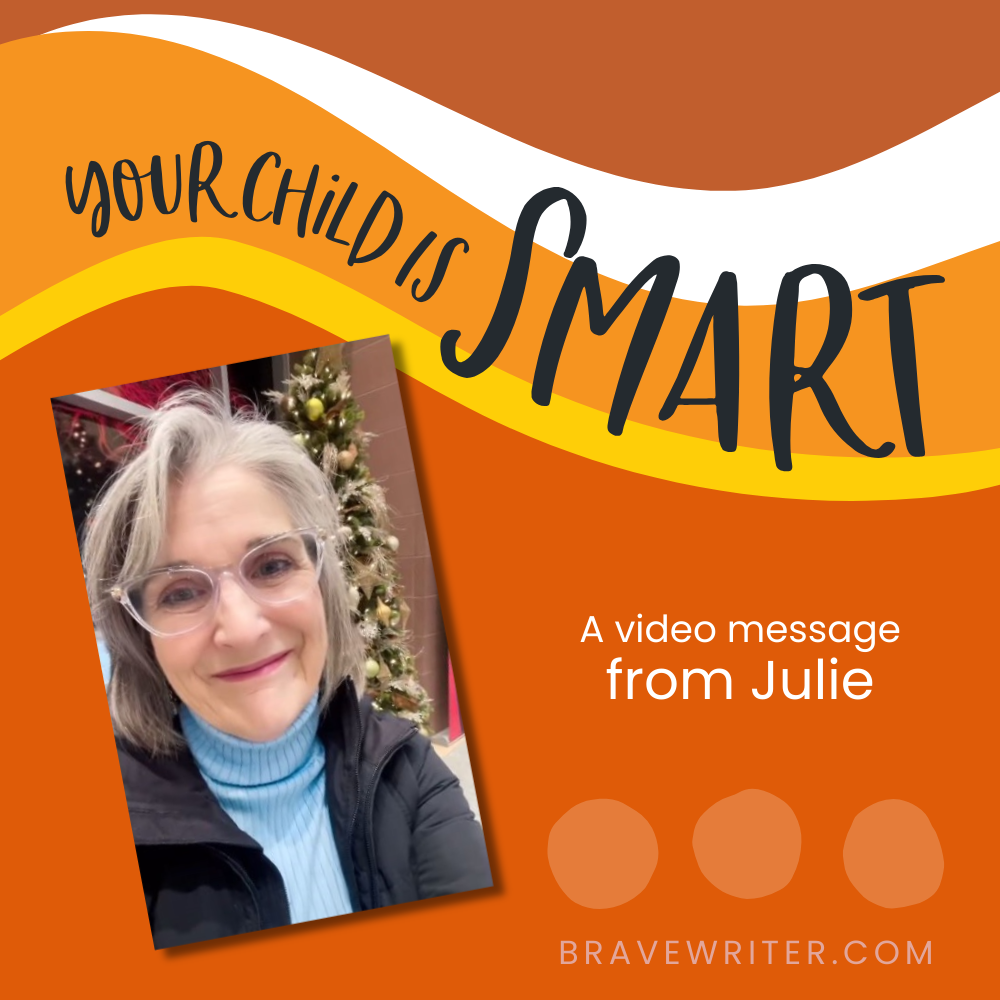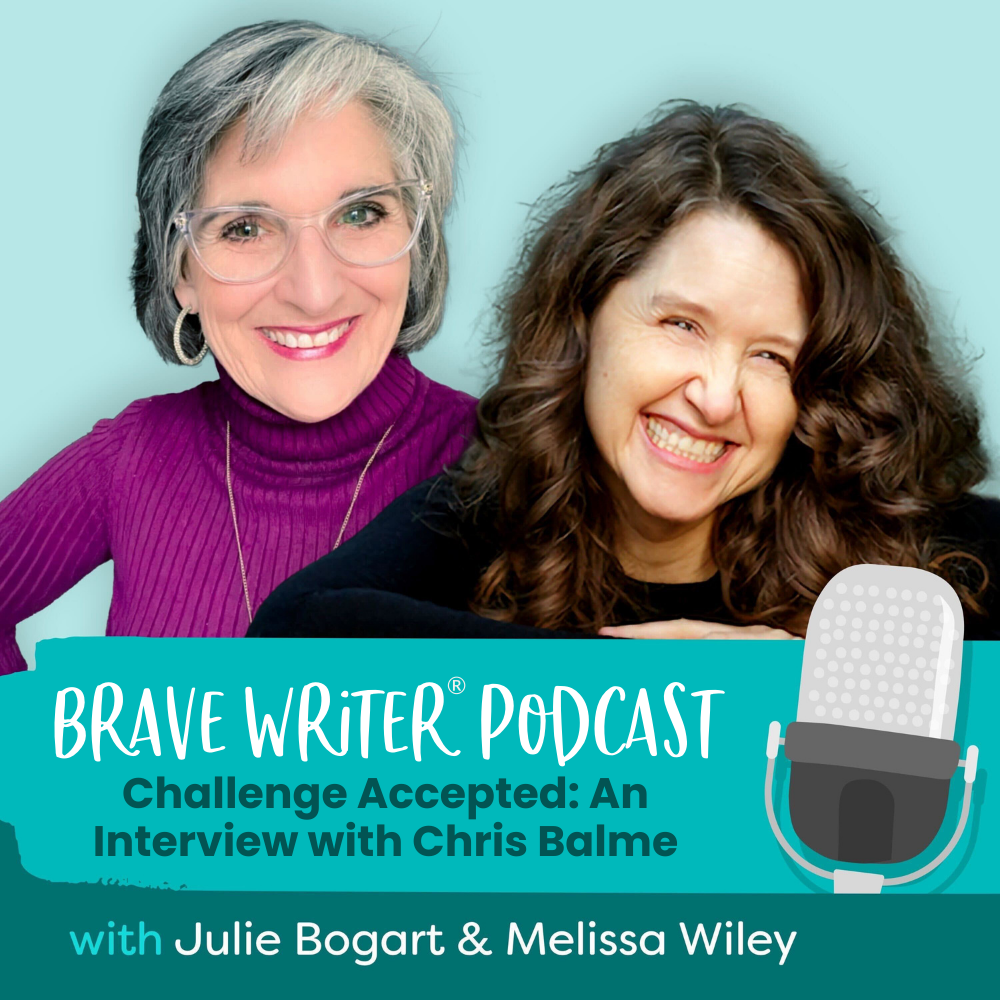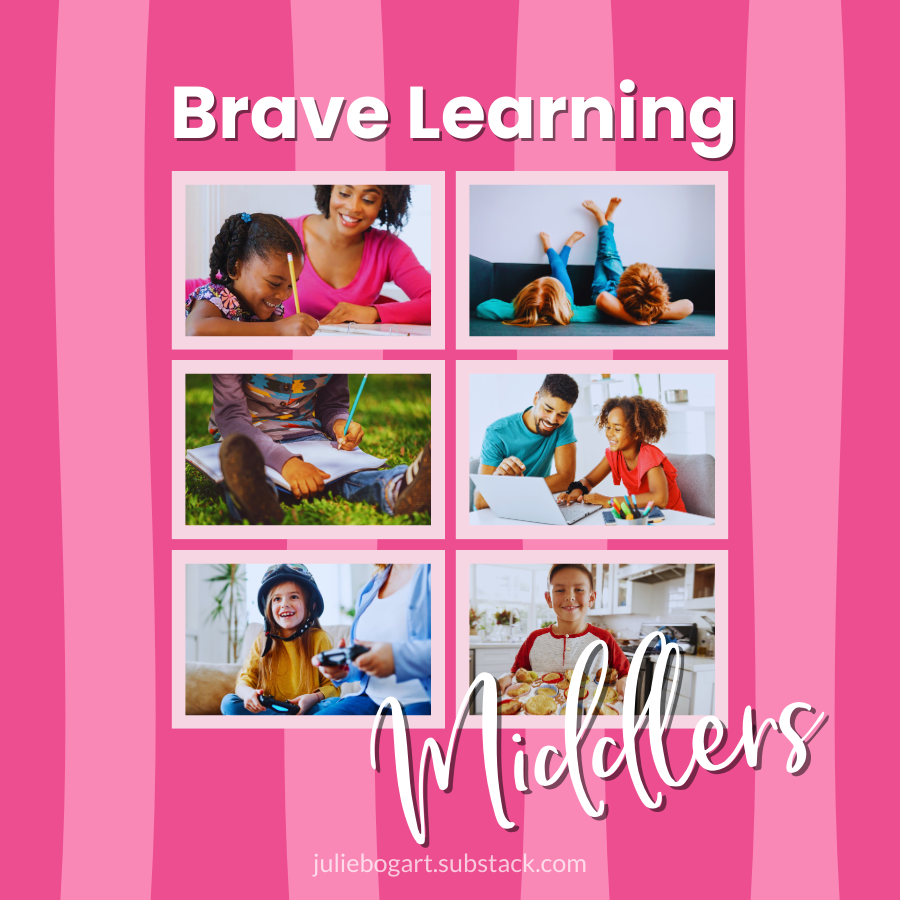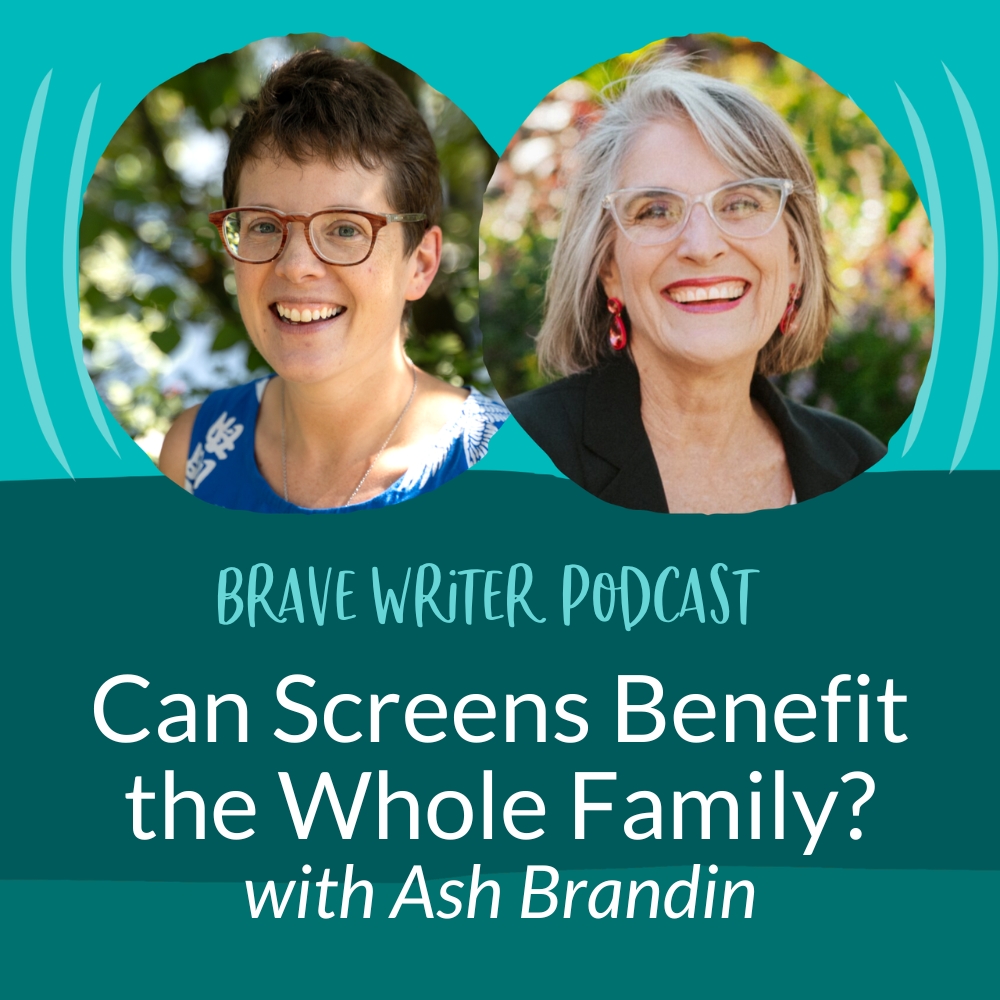
Your Child Is Smart

It’s incredible to realize that we have front row seats to the unique intelligence of our children. We alone know when they are clever and maximizing their particular brand of smarts. Be the parent who notices and brags about those skills.
If you can, express that admiration in front of that child. Goes a long way toward building a child into a human being who trusts their capacity to:
- problem solve,
- troubleshoot,
- aspire,
- and learn!
Watch the Video
Need more support?
Listen to the Brave Writer podcast. Literally, I talk about this stuff there every single week!
You might also read my book, The Brave Learner.
I’m here for you!
[Podcast #306] Challenge Accepted: An Interview with Chris Balme

One of the major perks of homeschooling is that the middle-school years can be about adventure instead of awkwardness.
In this Brave Writer podcast episode, Melissa chats with author Chris Balme about his book, Challenge Accepted: 50 Adventures to Make Middle School Awesome. Balme’s book invites young readers to discover how trust, agency, and meaningful challenges transform “awkward years” into growth years.
Join us for a conversation about kid-driven adventures—stealth art, teaching what you know, citizen science, apprenticeships, and building from scratch.
Plus we talk about practical ways to:
- close the gap between social perception and interpretation,
- repair friendships,
- and use side-by-side activities to spark conversation.
We also share why modeling a beginner’s mind (learning an instrument, sketching, coding) invites kids to try, fail, and try again.
Listen to the full episode to gather specific challenge ideas you can use this week and to reframe these years as the great adventure they are.
Show Notes
When we think of middle school, cultural messaging often paints it as the “awkward years,” something to simply survive. But what if we told a better story? That’s exactly what educator and author Chris Balme invites us to do in his new book Challenge Accepted: 50 Adventures to Make Middle School Awesome.
Chris has spent more than two decades working with adolescents, founding innovative schools and training parents and teachers. His mission is to reframe these years as one of the most magical and formative stages of human growth, rather than a gauntlet to endure. His perspective resonates with our Brave Writer philosophy: middle schoolers deserve trust, agency, and meaningful challenges that help them see themselves as capable and valued.
From “get through it” to “step into it”
Chris reminds us that middle schoolers are the “ultimate underdogs”—underestimated and often misunderstood. Their social awareness turns on almost overnight, leaving them flooded with new perceptions but little guidance on interpretation. This can make them vulnerable to overreacting, misjudging, or retreating. Yet, it’s also the perfect moment to equip them with the tools of resilience, relationship repair, and courage.
Instead of assuming they can’t handle responsibility, Chris urges us to give them challenges that matter. Whether it’s apprenticing with a neighbor, running a student café, or staging a protest march, kids light up when they realize adults trust them to contribute.
Adventures that build confidence
In Challenge Accepted, Chris offers 50 practical adventures that middle schoolers can take on their own or with friends. These aren’t worksheets—they’re invitations into real life.
- Be a stealth artist. Create and secretly “install” art in your community in playful, respectful ways.
- Share what you know. Teach others about your passion—whether it’s Greek mythology, coding, or skateboarding.
- Become a citizen scientist. Contribute to real research by logging birds, weather, or online data.
- Build something from scratch. A treehouse, a business, a Rube Goldberg machine—the process matters more than perfection.
- Forgive someone. Practice repairing friendships, an essential life skill often overlooked in adolescence.
Each adventure signals trust: We believe you are capable. And that message is what middle schoolers most need to hear.
Parallel growth—for kids and parents
One of our favorite takeaways from Chris is the reminder that kids watch how we approach challenges ourselves. When we pick up a cello, a guitar, or a sketchbook and let them see us fumble forward, we normalize imperfection. We show them it’s safe to begin again.
At Brave Writer, we call this the Building Confidence stage. Chris’s adventures align beautifully with our writing projects and practices, which emphasize real-world expression and connection. Together, we can rewrite the cultural script from “just survive” to “make it an adventure.”
Middle school doesn’t have to be a time of dread. With the right guidance—and the right adventures—it can become a story worth remembering.
Resources
- Learn more at Chris Balme’s website: www.chrisbalme.com
- Chris’s Substack: Growing Wiser
- Follow Chris Balme on Instagram: @chrisbalme
- Find CHALLENGE ACCEPTED: 50 ADVENTURES TO MAKE MIDDLE SCHOOL AWESOME in the Brave Writer Bookshop
- Fall class registration is open!
- Visit Julie’s Substack to find her special podcast for kids (and a lot more!)
- Purchase Julie’s new book, Help! My Kid Hates Writing
- Join us at the Brave Learner Home: https://bravewriter.com/brave-learner-home
- Learn more about the Brave Writer Literature & Mechanics programs
- Start a free trial of CTCmath.com to try the math program that’s sure to grab and keep your child’s attention
- Subscribe to Julie’s Substack newsletters, Brave Learning with Julie Bogart and Julie Off Topic, and Melissa’s Catalog of Enthusiasms
- Sign up for our Text Message Pod Ring to get podcast updates and more!
- Send us podcast topic ideas by texting us: +1 (833) 947-3684
Connect with Julie
- Instagram: @juliebravewriter
- Threads: @juliebravewriter
- Bluesky: @bravewriter.com
- Facebook: facebook.com/bravewriter
Connect with Melissa
- Website: melissawiley.com
- Substack: melissawiley.substack.com
- Instagram: @melissawileybooks
- Bluesky: @melissawiley.bsky.social
Produced by NOVA
The Danger of Black and White Thinking

In his book, Strong Religion, Gabriel Almond (plus authors) makes a case for the idea that when a society is going through seismic shifts that feel unnerving, the tendency is to double down on the past and black-and-white thinking. Many times we adopt a fundamentalist spirit, whether or not, we are religious.
The hallmarks of that fundamentalism are:
- a rejection of the threatening new ideas or technologies,
- and a desire to return to familiar ones that make a person feel safe and secure.
Black-and-white thinking leads to suspicion which creates in and out groups. Problem-solving to account for a variety of needs goes out the window.
How does this relate to home education?
In the homeschool space, sometimes we fall prey to fundamentalist thinking about education—who qualifies as a true homeschooler or we eye other educational spaces or philosophies with suspicion.
Critical thinking starts with curiosity and a willingness to dissent. It also expands to include uncomfortable perspectives in an attempt to learn from them. It means not having the comfort of certainty but the relief of having your own thoughts—even ones that don’t fit neatly into your group.
I know I’m in my black-and-white mind when I’m smug, flippant, and stop being curious about what makes someone else tick. I know I’m thinking better when I pause to wonder—why, how, what was it like for _____, and what don’t I know about this?
For more, watch the accompanying video.
Also, my book Raising Critical Thinkers offers tools to get out of black-and-white thinking.
Brave Learning: Middlers

Recently on Brave Learning…
If you have kids ages 8-10, these are especially for you!
Partnering with Your Child
Partnership Writing is the most overlooked stage of writing development. [More]
Tips for Enticing Your Children to Write
You can change how your kids feel about writing right now! [More]
How to Give Positive Writing Feedback
Let’s let our kids know that we enjoy their company, believe in their ideas, care about their success. [More]
Single Efforts Teach Profound Skills
Focus on what IS getting done. [More]
Know Your Kids as They Are
Instead of rules enforcement versus nurturing to the point of “catering to,” how about investigation and support/compassion? [More]
The Three Levels of Learning
You will see fruit in your homeschool writing program if you stay the course. [More]
Subscribe to Brave Learning on Substack where we chat, discuss, problem-solve, and create together. Here’s what you can expect: weekly themed content, freewriting prompts, and a podcast for kiddos called Monday Morning Meeting (first 6 are free)!
[Podcast #305] Can Screens Benefit the Whole Family? with Ash Brandin

Do you ever catch yourself treating screens like contraband—tolerated in tiny doses, never to be openly celebrated?
Ash Brandin, author of Power On: Managing Screen Time for the Benefit of the Whole Family, urges us to view screens as morally neutral and to focus on how they can serve the whole family’s needs.
In this Brave Writer podcast episode, Ash shares their “Screen Time ABCs”:
- Access that adapts to context rather than rigid caps
- Behavior as neutral data rather than blame
- Content choices that create better stopping points
They offer practical tactics like sticky-note reminders for Minecraft, reducing scarcity with predictable access and occasional “yes days,” using body doubling for schoolwork, and setting YouTube Kids to Approved Content Only to eliminate ads and algorithms. Ash also addresses AI, encouraging us to teach kids digital literacy and vetting skills rather than fear.
Their perspective replaces guilt with guidance, helping families connect through technology instead of fighting against it. Tune in to hear Ash’s thoughtful strategies and mindset-shifting advice.
Show Notes
Start with needs, not minutes
Ash points out that parents often ask, “Is there a right amount?” Instead of hunting for a magic number, they recommend evaluating needs and trade-offs. If an hour of Minecraft results in ninety minutes of meltdown, the exchange rate is poor. If a PBS show during a delayed dinner brings calm to the table, that’s a benefit worth naming. The goal isn’t austerity; it’s alignment—matching screen use to the people, the moment, and the mission.
Use the ABCs to guide decisions
One of Ash’s most practical tools is the “Screen Time ABCs”:
- A is for Access: When, where, and how long? Access flexes with real life. The American Academy of Pediatrics now emphasizes a family media plan over rigid time caps, a shift Ash applauds.
- B is for Behavior: Behavior is data, not judgment. A child’s outburst after gaming isn’t proof that “screens are bad”—it’s an opportunity to notice patterns, teach self-awareness, and practice regulation.
- C is for Content: Different media have different exit ramps. A Mario Kart race ends naturally; Minecraft doesn’t. Ash suggests asking, “How will you know you’re done today?” and, “What’s the first thing you’ll do when you come back?” A sticky note reminder can turn a meltdown into a manageable pause.
Reduce scarcity; increase trust
Ash reminds us that scarcity breeds desperation. Predictable opportunities—plus the occasional “yes day”—can normalize screen use and build trust. Children who know their passions are honored are more likely to accept limits without resentment.
Sit closer to their digital life
Parents don’t have to love every game to love the child who plays it. Ash encourages curiosity: peek over a shoulder, help set up a console, or ask, “What was the best part of that session?” Sometimes, body doubling—working side by side—can ease online schoolwork struggles. Even offline drafts before typing into an online portal can help.
Smart safety without panic
Ash emphasizes principle over panic. On YouTube Kids, for example, the “Approved Content Only” setting eliminates ads and the algorithm while preserving real choice through trusted channels like PBS Kids. Free apps, on the other hand, often come at the hidden cost of data, attention, or intrusive ads.
About AI (and why tone matters)
Ash is clear: AI isn’t going back in the bottle. Their advice? Teach digital literacy and emotional safety. Help kids understand what AI is (a pattern-predicting tool, not a friend), and model curiosity and vetting skills. Invite children to run an “AI audit” by asking ChatGPT about a subject they know well, then evaluate what it got right and wrong.
Ash’s work shifts the conversation from guilt to guidance. When we adopt their neutral, practical approach, we empower our families to use technology wisely and sustainably—for connection, creativity, and calm.
Resources
- Follow Ash Brandin on Instagram: @thegamereducator
- Read Power On: Managing Screen Time for the Benefit of the Whole Family by Ash Brandin
- Fall class registration is open!
- Visit Julie’s Substack to find her special podcast for kids (and a lot more!)
- Purchase Julie’s new book, Help! My Kid Hates Writing
- Join us at the Brave Learner Home: https://bravewriter.com/brave-learner-home
- Learn more about the Brave Writer Literature & Mechanics programs
- Start a free trial of CTCmath.com to try the math program that’s sure to grab and keep your child’s attention
- Subscribe to Julie’s Substack newsletters, Brave Learning with Julie Bogart and Julie Off Topic, and Melissa’s Catalog of Enthusiasms
- Sign up for our Text Message Pod Ring to get podcast updates and more!
- Send us podcast topic ideas by texting us: +1 (833) 947-3684
Connect with Julie
- Instagram: @juliebravewriter
- Threads: @juliebravewriter
- Bluesky: @bravewriter.com
- Facebook: facebook.com/bravewriter
Connect with Melissa
- Website: melissawiley.com
- Substack: melissawiley.substack.com
- Instagram: @melissawileybooks
- Bluesky: @melissawiley.bsky.social
Produced by NOVA






























